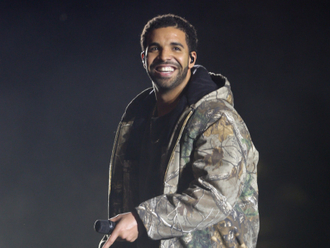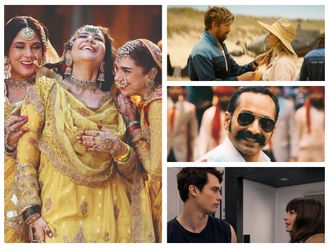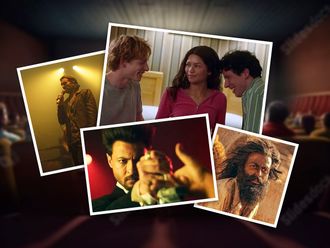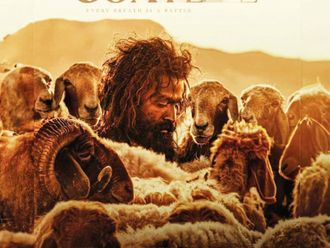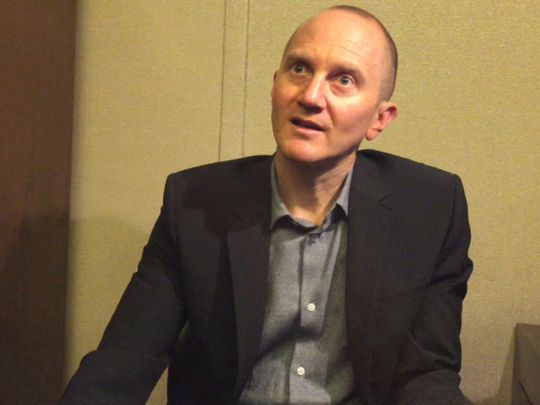
Dubai
When bestselling author Chris Cleave was researching at a military cemetery in Malta for his latest novel Everyone Brave is Forgiven, he discovered something unusual: every grave held six people.
He asked the cemetery caretaker why, and was told to try digging a hole anywhere on Malta to find out. So he did.
Cleave told Gulf News: “That’s how I found that there’s only six inches of top soil there, above this solid, yellow limestone. It’s incredibly hard to dig a hole, and it was especially hard for people during the siege of Malta, which is when my book is set, where they were starving and didn’t have the strength to dig.”
It was the moment that turned his novel on its head.
Cleave said: “That, for me, was the sudden insight into how starved the people were, during the siege, that they couldn’t even dig one hole for each of their dearly loved friends who died… It’s the sort of thing that you can only find out by being there, by going there, and really engaging. Sitting at home and using the internet, I wouldn’t have known the question to ask, to start launching me down that route.”
The British author of Incendiary, The Other Hand and Gold was at the Emirates Airline Festival of Literature this year, and spoke with Gulf News about writing novels, the human side of news stories, and how “if you can do it while sitting down, on the internet, it’s not research”.
Watch his full interview below.
Each of your books is very different from the other. Can you share a little bit about the creative process?
I always start with a question. At the heart of all of my work, there’s a question that has occurred to me… as being very personal. For The Other Hand, that question came to me when I was reading about, what we now call, the refugee crisis. Ten years ago, it was just the start of that and I was starting to meet in London, refugees who, at that stage, were coming from Sub-Saharan Africa mostly. I was asking them what their life experience had been, and it was so different from mine, I started with this question – how much of our comfortable lives should we give up to help these people, who have just been unlucky? I’ve never come from this place of thinking that I have deserved or earned any of the good fortune I’ve had. I was just born lucky. And those people weren’t. So how much of that luck should we give to the people who have nothing? It’s a really interesting question. You can’t give everything or you’re creating two problems. But you must give something – so how much?
In Incendiary, which was my first novel, it’s really about the war on terror, which was what we were then calling it. I think when you declare war on a noun, writers are involved. They’re on the frontline of that. So I had a question, which was – what does that mean? Can you beat terror? Because terror is a concept, it’s a feeling. How do you win that war? That’s the question at the heart of Incendiary.
With my new book, Everyone Brave is Forgiven, the question is – what does it mean to be brave? In peace time and in war time, and in the strange time that we live in now, which is sort of half way in between. My country is informally at war in various different theatres. What does it mean to be a brave citizen in times like that? Is it better to stand up against your country and point out what it’s doing wrong, or is it better to keep quiet and act in a unified way? I don’t know. And because I think it’s an interesting question, I put it into a novel.
Do you try to get answers to your questions through your novels, or just get people thinking of the same questions? What is your goal?
My goal in the novel is to treat the reader with infinite respect. I think people come to a book with so much of their own lives in it, I don’t think my job as a writer is to tell them what to think. And certainly not to answer those questions. I don’t know the answers – I know that it’s an interesting question and I know that I can make it beautiful and engaging. So that’s the respect that I give to the reader. I say: Look, this is worth eight hours of your time, it will take you on a journey and arm you with some of the facts and the emotional tools you need to think about this question in your own life. So for me, my novel is a real psychological journey for the characters, but also for the reader. But I want it to be enjoyable and worth their time. So I don’t answer their questions, I just tee them up in an interesting way, whilst really respecting the intelligence and the emotions of my readers.
Do you think the topics you cover – terrorism, refugee crisis – connect with people more when fictionalised, rather than when it is presented in the form of a news report or a nonfiction book?
I think it takes all different kinds of people, working on all different channels, with a big heart, to really talk about this complicated world we live in. I’ve chosen fiction because I think it lets you tell a true story about things that are almost impossible to talk about in the news. So, in the news you get a 2.5 minute segment, you don’t have time to go into – why did people act that way? So the news has to call people crazy, animals or the enemy, because it only has 2.5 minutes. It doesn’t have time to say ‘this person is angry because… this happened to their village or this happened to their mother…’. People are complicated and they have deep roots, and you can explore this in fiction. I’ve chosen fiction because I think you can tell a true story, a deep story, about who we are. I think fiction doesn’t have the same need that the news has, to dehumanise the enemy. I think it lets you speak about the human spirit in a universal way, and that’s why I love novels. But I couldn’t do my work unless it was informed by the work of investigative journalists and reporters who I talk with a lot. People who are the eyes and ears of the society… When I say that I’ve chosen fiction, I don’t think of it as a superior choice. No, it’s a useful choice that I think works for me. But I’m standing on the shoulders of people who are taking bigger risks than me, and are out there working in the real world, the world of news reporters.
In an interview with Chuck Palahniuk back in 2010, you had said: “I think literature has a lot to learn from music about how it should structure itself and how it can stay relevant to people.” Do you still think it’s not as relevant today?
I have noticed a lot that in the literary world, you become a writer, you write a book, you stay a writer, write another book… whereas in music, you start out selling mixed tapes from out of the back of a car. Then you become a rapper, then you make some great records, then you become a producer and go on to own a record label. You then branch out and then own the company that owns record labels. That’s great for two reasons. Number one, it keeps everyone in the industry dynamic. Number two, because it always makes room for fresh artistes to come up. There’s always room and it’s an industry that’s always making space because everyone is moving through it. For that reason, I think that music is endlessly dynamic because of its structure. We should structure ourselves more like the music industry; that gives us the space for the ambition of writers, while also making space for new work.
It’s evident that a lot of research has gone into your novels. Could you advise new writers on how to do research for their books?
If you can do it while sitting down, on the internet, it’s not research. It’s something that everyone can know. Whereas your job, your contract, your unspoken, solemn vow to the reader, is that you will do real work so that they don’t have to. They need to be able to trust you to have been to all the places you’re writing about. To have touched that soil, to know what colour it is, to know how it feels… to have spoken to real people that are concerned with the events about which you want to speak, to have eaten the food the characters eat, to have listened to the music your characters listen to, to have read the novels that your characters would have read, to know what sort of job they do by often doing it yourself. I tell new writers to think of themselves like method actors. To really try to live as much as possible, the lives of their characters. Why? Because it shows you the questions you didn’t even know you needed to ask Google.
A really good example for me is when I was researching Everyone Brave is Forgiven, I spent a lot of time in Malta, where half the novel is set. I noticed in the military cemeteries, there were six people buried in every grave. That’s very unusual for a military cemetery, and I asked why? The person who was tending the cemetery told me, look, you go and try digging a hole anywhere on this island. And I did, and that’s how I found that there’s only six inches of top soil there, above this solid, yellow limestone. It’s incredibly hard to dig a hole, and it was especially hard for people during the siege of Malta, which is when my book is set, where they were starving and didn’t have the strength to dig. And that, for me, was the sudden insight into how starved the people were, during the siege, that they couldn’t even dig one hole for each of their dearly loved friends who died. That, for me, was when the whole book started to come alive. It’s the sort of thing that you can only find out by being there, by going there, and really engaging. Sitting at home and using the internet, I wouldn’t have known the question to ask, to start launching me down that route.
I’d say to writers who are thinking about researching a novel – love people. Be curious about people. Really be interested. Get out of the house and meet people, ask them questions. Your book will probably go in a direction you never planned it to go in. And that’s because it’s alive.


